Getting enough quality sleep is essential for your physical and mental health. To improve your sleep hygiene, stick to a consistent schedule, create a relaxing bedtime routine, and optimize your environment by controlling light and temperature. Limiting screen time, avoiding caffeine and heavy meals before bed, and practicing relaxation techniques can help you wind down. Small, regular changes can make a big difference—if you keep going, you’ll discover even more ways to support restful, restorative sleep.
Key Takeaways
- Maintaining a consistent sleep schedule helps regulate your circadian rhythm and improves sleep quality.
- Creating a relaxing bedtime routine signals your brain to wind down and prepares you for restful sleep.
- Optimizing your sleep environment by controlling light, temperature, and noise enhances sleep depth and duration.
- Limiting screen time and caffeine before bed prevents melatonin suppression and sleep disruptions.
- Incorporating calming activities like meditation or gentle stretching promotes relaxation and supports better sleep hygiene.
Understanding Why Sleep Is Essential for Health
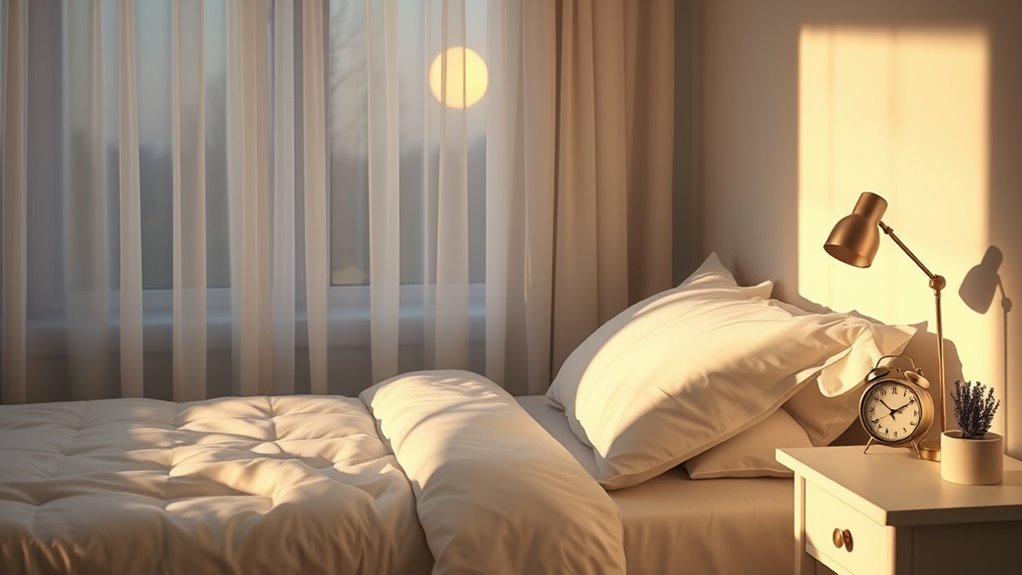
Sleep is crucial for your overall health because it allows your body to recover, repair, and recharge. During sleep, especially REM sleep, your brain consolidates memories and processes emotions, boosting mental clarity and emotional resilience. The benefits of REM sleep are essential for learning, creativity, and problem-solving. When you don’t get enough sleep, the impact of sleep deprivation quickly shows—your concentration drops, your immune system weakens, and your mood suffers. Chronic sleep deprivation increases risks for serious conditions like heart disease, diabetes, and depression. Understanding why sleep matters helps you prioritize it, recognizing that quality sleep isn’t a luxury but a necessity for maintaining your physical, mental, and emotional well-being. Prioritizing sleep ensures you stay healthier, sharper, and more energized every day. Recognizing the importance of sleep can motivate you to adopt better sleep habits and improve your overall quality of life.
Recognizing Common Sleep Disruptors and Their Impact
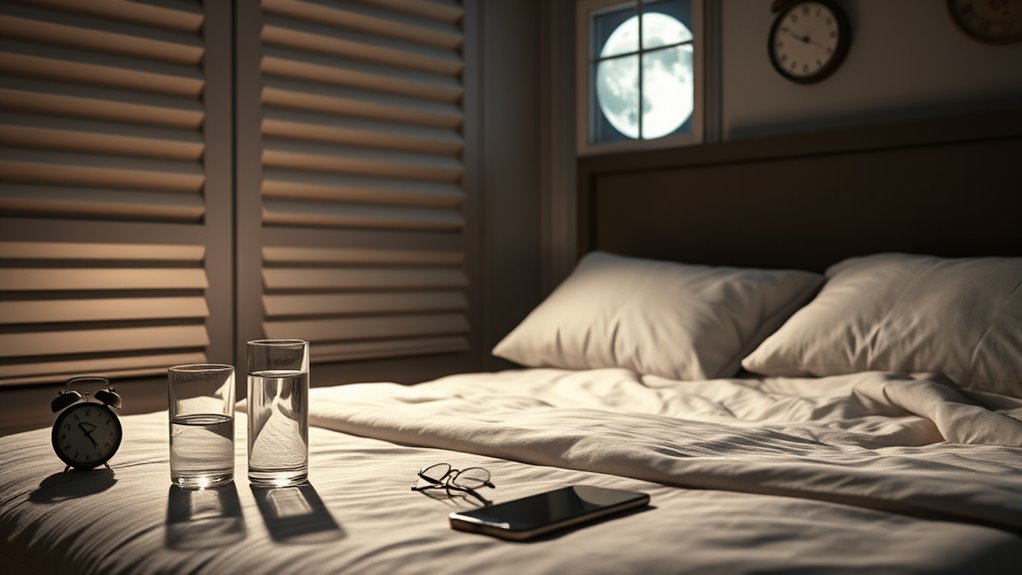
Many factors can interfere with your ability to get restful sleep, and recognizing these disruptors is key to improving your sleep quality. Excessive screen time before bed can disrupt your circadian rhythm by suppressing melatonin production, making it harder to fall asleep. Similarly, high caffeine intake—especially later in the day—acts as a stimulant, delaying sleep onset and reducing sleep quality. Other common disruptors include stressful activities, irregular routines, and consuming heavy meals close to bedtime. Additionally, best anime movies can serve as a distraction that keeps your mind active, making it harder to wind down. By being aware of these factors, you can take steps to minimize their effects. Reducing screen time in the evening and limiting caffeine consumption can profoundly improve your ability to fall asleep faster and enjoy more restorative sleep throughout the night.
Creating a Consistent Sleep Schedule
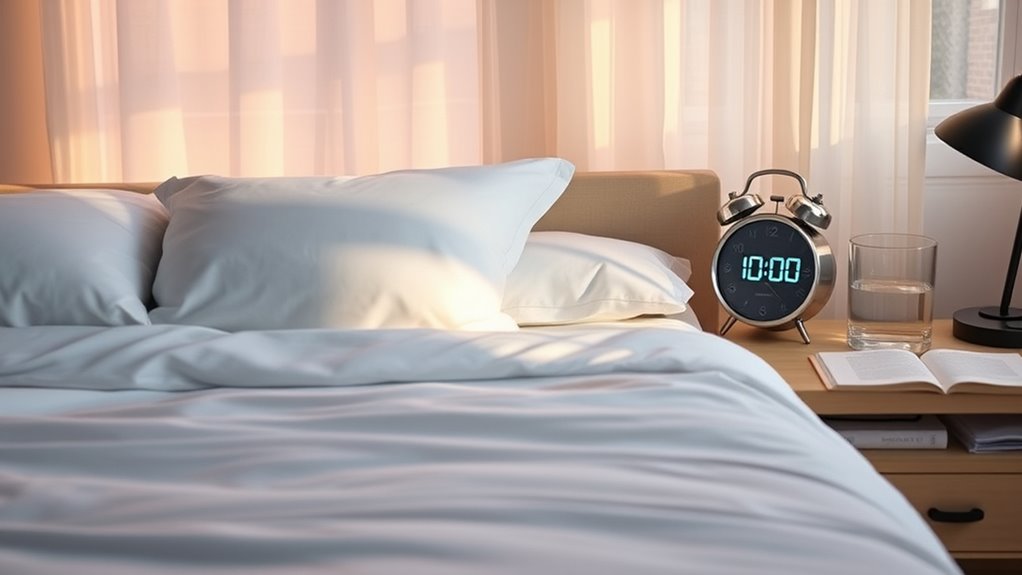
Establishing a consistent sleep schedule is one of the most effective ways to improve your overall sleep quality. When you stick to regular bed and wake times, you promote better sleep consistency, helping your body establish a natural rhythm. To support this, develop a calming bedtime routine that signals to your brain it’s time to wind down. Avoid irregular sleep times, even on weekends, as they can disrupt your internal clock. Consistency helps regulate your circadian rhythm, making it easier to fall asleep and wake up feeling refreshed. By prioritizing a steady schedule and establishing relaxing bedtime routines, you enhance your sleep quality and set yourself up for better overall health.
Optimizing Your Sleep Environment for Better Rest
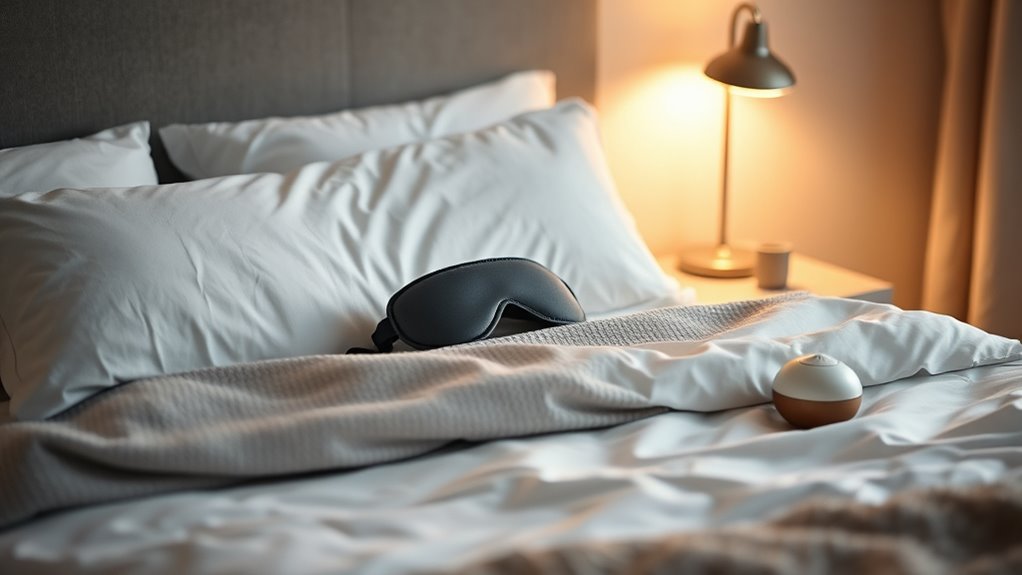
To improve your sleep, focus on controlling light exposure by dimming or blocking out harsh lights before bed. Keep your bedroom at a comfortable temperature to help you relax and stay asleep through the night. Small adjustments in lighting and temperature can make a big difference in the quality of your rest. Using an air purifier can also reduce airborne allergens and odors, creating a cleaner sleep environment.
Control Light Exposure
Controlling your light exposure is essential for creating a sleep-friendly environment. Your circadian rhythm relies heavily on light cues to regulate sleep and wake cycles. Too much artificial light before bed can disrupt this rhythm, making it harder to fall asleep. To optimize your sleep environment, reduce exposure to bright screens an hour before bedtime and dim lights in your home. Natural light during the day helps reinforce your circadian rhythm, promoting better sleep at night. Consider using blackout curtains or a sleep mask to block outside light. Here’s a quick guide:
| Light Exposure Tips | Timing | Impact |
|---|---|---|
| Limit evening screen time | 1 hour before bed | Supports circadian rhythm |
| Use dim, warm lighting | Evening | Encourages melatonin production |
| Get morning sunlight | Morning | Reinforces your sleep cycle |
| Block outside light | Night | Prevents disruption |
Adjusting your light exposure helps reset your internal clock for more restful sleep. Understanding how light cues influence your sleep patterns can further enhance your sleep hygiene practices.
Maintain Comfortable Temperature
Maintaining a comfortable temperature is essential for achieving restful sleep, as your body’s internal temperature naturally drops when you prepare to sleep. To optimize your sleep environment, focus on climate control by setting your room to a cool, consistent temperature—around 60-67°F (15-19°C) is ideal. Proper bedding selection also plays a key role; choose breathable sheets and blankets that help regulate moisture and temperature. Avoid overheating or feeling too cold, which can disrupt your sleep cycles. Use a fan, air conditioner, or heater if needed to maintain a stable climate throughout the night. A well-regulated temperature makes it easier to fall asleep and stay asleep, enhancing your overall sleep quality and ensuring you wake up feeling refreshed. Incorporating climate control techniques can further improve your sleep environment and overall restfulness.
Developing Bedtime Rituals to Signal Your Body It’s Time to Sleep
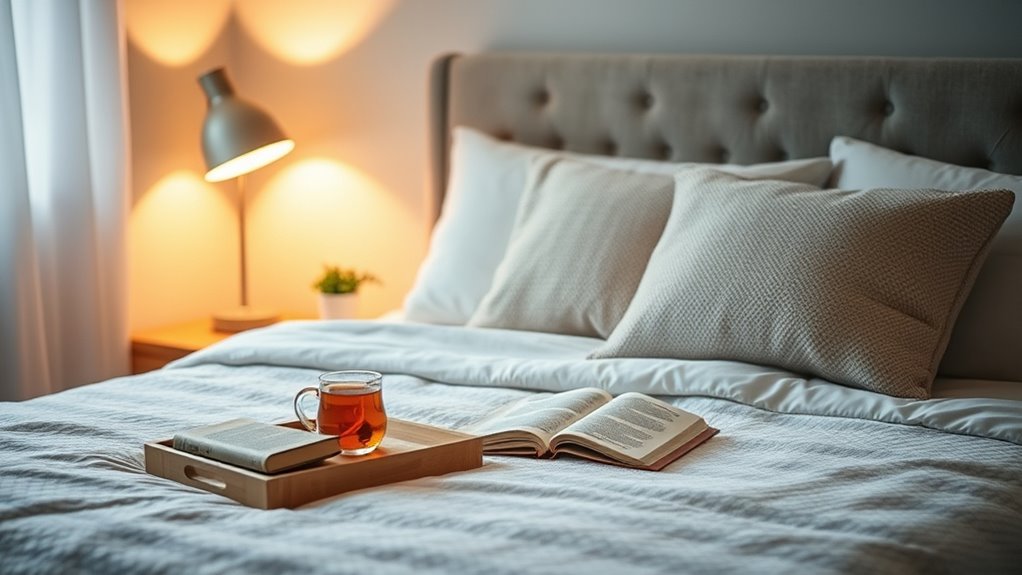
Creating a consistent bedtime routine helps your body recognize when it’s time to sleep. Incorporate relaxing activities like reading or gentle stretching to signal relaxation. These rituals make it easier to fall asleep and improve your overall sleep quality. Establishing a calming environment can also enhance your sleep hygiene by reducing distractions and promoting relaxation before bed.
Establish Consistent Routine
Establishing a consistent bedtime routine helps signal to your body that it’s time to wind down and prepare for sleep. By sticking to a regular schedule, your body learns when to release melatonin, making it easier to fall asleep. Incorporate activities like sleep tracking to monitor your sleep patterns and identify what disrupts your rest. Over time, analyzing your dreams can offer insights into your sleep quality and underlying stressors. Consistency in your routine—going to bed and waking up at the same time—builds a reliable rhythm that promotes restorative sleep. Avoid drastic changes, and prioritize habits that reinforce your sleep signals. This steady pattern helps your body associate certain cues with sleep, making it easier to drift off and stay asleep through the night. Additionally, considering tuning techniques that optimize your body’s natural responses can further improve sleep quality.
Incorporate Relaxing Activities
After setting a consistent sleep schedule, adding relaxing activities before bed can strengthen your body’s signals that it’s time to sleep. Incorporate mindful breathing exercises to calm your mind and reduce stress, helping you shift smoothly into rest. Listening to calming music can create a peaceful environment, signaling to your body that it’s time to wind down. Establishing these rituals makes it easier to relax your muscles and quiet your thoughts, reinforcing your bedtime routine. Avoid screens and stimulating activities during this time, as they can interfere with your relaxation. Using crochet styles for locs or other gentle crafts as part of your pre-sleep routine can further enhance your relaxation and create a calming atmosphere. By consistently practicing these calming activities, you’ll train your body to recognize when it’s time to sleep, leading to better sleep quality and a more restful night.
Managing Diet and Lifestyle Choices for Improved Sleep Quality

To improve your sleep quality, paying attention to your diet and lifestyle choices is essential. Start with diet adjustments by reducing caffeine and alcohol intake, especially in the hours before bed, as they can disrupt your sleep cycle. Incorporate more fruits, vegetables, and whole grains to support overall health and promote restful sleep. Lifestyle modifications also play a vital role; maintain a consistent sleep schedule, avoid heavy meals late at night, and limit screen time before bed. Regular physical activity can help you fall asleep faster, but avoid vigorous exercise close to bedtime. Additionally, using airless paint sprayers for home improvement projects can reduce stress and improve your environment, contributing indirectly to better sleep. By making these mindful changes, you create a sleep-friendly environment that encourages deeper, more restorative sleep each night.
Incorporating Relaxation Techniques to Ease Into Sleep
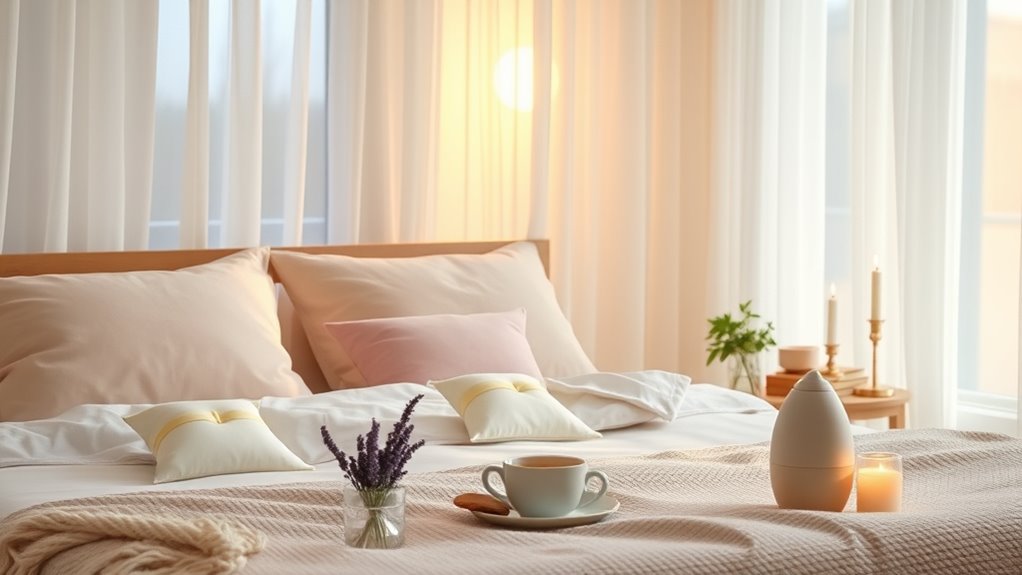
Incorporating relaxation techniques into your bedtime routine can considerably ease your shift into sleep. One effective method is guided meditation, which helps clear your mind and reduce stress. Find a comfortable position, listen to a calming voice or sounds, and focus on your breath or a peaceful image. Deep breathing exercises also promote relaxation by slowing your heart rate and calming your nervous system. Try inhaling slowly through your nose for a count of four, holding for a count of four, then exhaling gently for four counts. Repeating this cycle a few times prepares your body to transition smoothly into sleep. These techniques lower anxiety and create a peaceful mental state, making it easier to drift off naturally. Incorporating voiceover techniques can further enhance your relaxation by guiding your focus and calming your mind.
Monitoring and Adjusting Your Sleep Habits for Long-Term Success
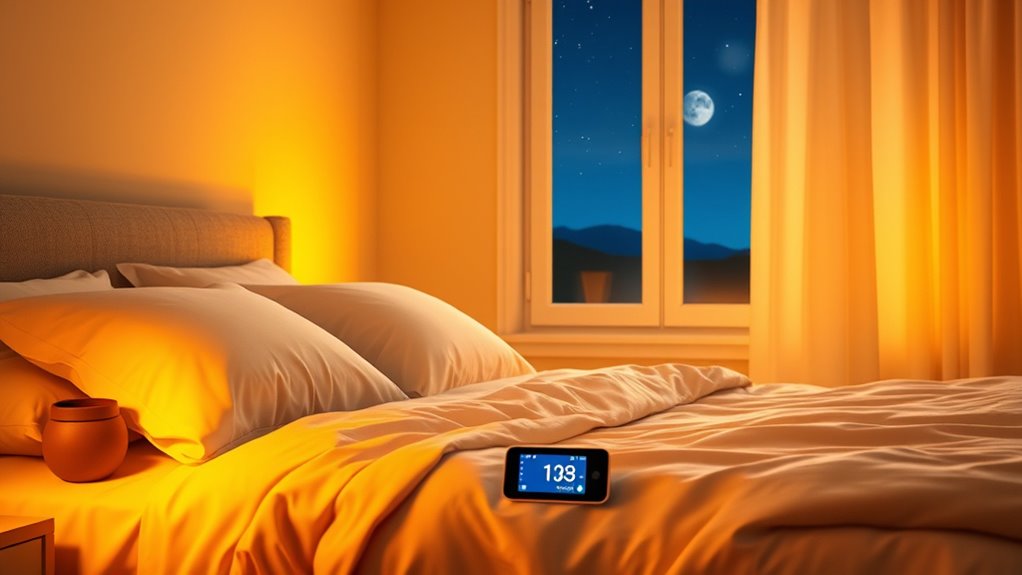
Building on the relaxation techniques that help you fall asleep, paying attention to your sleep habits over time makes sure you maintain and improve your sleep quality. Tracking patterns in your sleep—such as bedtime, wake time, and nighttime awakenings—helps you identify what’s working and what’s not. Regularly monitoring these patterns allows you to adjust routines accordingly, like shifting your bedtime earlier or later, or reducing screen time before bed. By staying aware of your sleep habits, you can make informed changes that promote consistent, restful sleep. Remember, small adjustments over time lead to long-term success. Consistently evaluate your sleep habits, stay flexible, and fine-tune your routines to achieve better sleep health and overall well-being.
Frequently Asked Questions
How Does Stress Affect Sleep Quality and Duration?
Stress affects your sleep quality and duration by releasing stress hormones like cortisol, which can interfere with your sleep cycles. When you’re stressed, your body stays alert, making it harder to fall asleep and stay asleep through the night. Elevated stress hormones disrupt the natural progression of sleep stages, leading to restless nights and less restorative sleep. Managing stress helps regulate these hormones and supports healthier sleep patterns.
Can Daytime Napping Improve Overall Sleep Health?
Napping benefits your overall sleep health by providing daytime sleep that can boost alertness, improve mood, and reduce fatigue. Short naps, around 20-30 minutes, help prevent grogginess and enhance cognitive function. Longer naps might lead to sleep inertia, but if timed right, they can supplement nighttime sleep effectively. Incorporate strategic daytime sleep to balance your sleep needs and promote better rest at night.
What Are the Best Natural Remedies for Insomnia?
You’re looking for natural remedies for insomnia. Try herbal teas like chamomile or valerian to promote relaxation before bed. Aromatherapy diffusers releasing lavender or bergamot can also help calm your mind and improve sleep quality. Establish a calming bedtime routine, avoid screens, and create a peaceful environment. These natural approaches, combined with good sleep habits, can make a significant difference in overcoming insomnia naturally.
How Does Screen Time Before Bed Impact Sleep Patterns?
Imagine you’re in 2023, yet staring at your screen like it’s 1984. Blue light exposure before bed messes with your circadian rhythm, making it harder to fall asleep. It disrupts your natural bedtime routines, reducing sleep quality and duration. To improve your sleep, limit screen time at least an hour before bed, switch to calming activities, and use blue light filters. Your sleep will thank you.
Are There Specific Foods That Promote Better Sleep?
You can boost your sleep by eating sleep-inducing foods like almonds, cherries, and warm milk. Incorporate these into your dietary habits to help your body relax and prepare for rest. Avoid heavy or spicy meals before bed, as they can disrupt sleep. Focus on a balanced diet with foods rich in magnesium and tryptophan, which naturally promote better sleep. Making these small changes can improve your overall sleep quality.
Conclusion
Prioritizing good sleep isn’t just about feeling rested—it’s essential for your health. Did you know that poor sleep increases your risk of heart disease by 48%? By following simple steps like maintaining a consistent schedule and creating a relaxing environment, you can greatly improve your sleep quality. Remember, small daily changes lead to lasting benefits. Make sleep a priority, and you’ll enjoy better health, mood, and energy every day.









